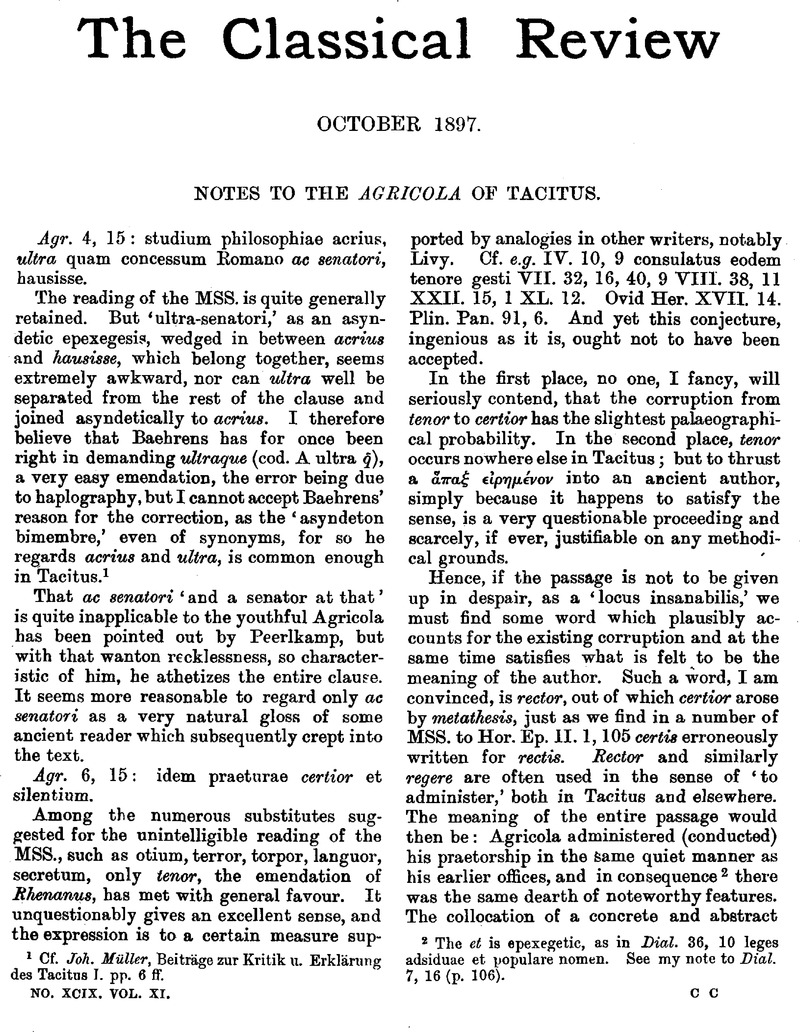No CrossRef data available.
Article contents
Notes to the Agricola of Tacitus
Published online by Cambridge University Press: 27 October 2009
Abstract

- Type
- Other
- Information
- Copyright
- Copyright © The Classical Association 1897
References
page 325 note 1 Cf. Joh. Müller, Beiträge zur Kritik u. Erklärung des Tacitus I. pp. 6 ff.
page 325 note 2 The et is epexegetic, as in Dial. 36, 10 leges adsiduae et populare nomen. See my note to Dial. 7, 16 (p. 106).
page 326 note 1 See esp. Maxa, Progr. Radantz 1. (1885) pp. 44 ff.—These admirable discussions of the cruces in the Agricola seem to have been unduly neglected. Their author unfortunately only lived to complete fifteen chapters, the last programme being published after his death in 1887.
page 326 note 2 H. IV. 47, 6 Ann. XVI. 6, 7.
page 326 note 3 He gave to duxit the meaning of putavit and construed it with a genitive after the analogy of ‘ratus,’ e.g. Tac. Ann. III. 20.
page 326 note 4 The same is true of ‘indignus’ which takes the copula only in the following passage. Ann. I. 42, 16: si … aspernaretur, tamen mirum et indignum erat, where its insertion is also easily accounted for.
page 326 note 5 De breviloquentia Tacitea etc. p. 43 ff. Cp. also Petzke, Dicendi genus Tacitinum quatenus differat a Liviano, Diss. Königsberg pp. 35 ff. (1888),
page 326 note 6 l.c. II. 21–26.
page 327 note 1 According to Maxa l.c. II. p. 24, the insertion of ‘ac’ or ‘et’ has long ago been suggested by Schömann, Greifswald Index Lect. 1859–60 p. 7, but this article has not been accessible to me. Andresen, by some curious error, attributed ‘ac-persuasiones’ to Glück.
page 327 note 2 Maxa l.c. II. p. 33.
page 327 note 3 Cf. Jour. Phil. XII. pp. 454 ff. and my note to Dial. c. 37, 18 (p. 348).
page 328 note 1 The absurdity of this violent change will become the more manifest, when the conviction has gained ground, as I am confident it will, that the whole chapter is unintelligible except on the presumption of an expedition to Ireland. Cf. W. Pfitzner, Progr. Neustrelitz 1893 pp. 34 and Fleckeisen's Jahrb. vol. 153 pp. 560—564.
page 329 note 1 This note had long been written, when I found that Constans, Rev. de phil. XXI. p. 29 had advocated the same reading, bnt he gives no grounds for his opinion.
page 329 note 2 Cf. esp. Woelfflin, Phil. XXVI. p. 154.
page 330 note 1 Synonymous, as often in Tacitus, with enim, which could not have been used here for obvious reasons.
2 It may b noted in passing that the Stoics, whose doctrines are clearly here hinted at, probably did not reckon ‘glory’ as among the mala or ![]() , for, as Cicero facetiously remarked (pro Arch. 11, 26), they never fail to put their names to their treatises ‘de gloria contemnenda.’
, for, as Cicero facetiously remarked (pro Arch. 11, 26), they never fail to put their names to their treatises ‘de gloria contemnenda.’
page 331 note 1 Cf. Heller, Philol. LI. pp. 340 ff., retains the non, but his treatment does not touch the points at issue.
page 331 note 2 Cp. 7 magnam patrimonii partem diripuit (sc. classis Othoniana).
page 331 note 3 Cp. 4 and Urlichs, De vita et honoribus Agricolae p. 8.


